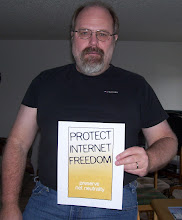 I've been hearing an awful lot of complaining about a "Digg oligarchy" and how Digg's "power users" tend to monopolize the front page.
I've been hearing an awful lot of complaining about a "Digg oligarchy" and how Digg's "power users" tend to monopolize the front page.In my studied opinion, that's not Digg's real problem (if you're already a power user, you may want to go ahead and skip to "Content Should Rule," below); the domination of the front page by a few users is due not so much to any oligarchy or monopoly, but more to the fact that certain Diggers -- go ahead and call 'em "power users" if that works for you -- have figured out how to effectively use the tools available to anyone on the Digg social bookmarking site to give submitted content the best possible shot at the front page.
Actually, it’s not that difficult to figure out, once you’ve been on the site a couple months and see how it works.
• Develop a network of friends
• Figure out effective headline writing and article summarizing; and
• Suss out the types of content that Digg users tend to go for (this doesn't have to mean pandering; just angling effectively!)
Hitting strongly on all three of those can get anyone (at least anyone with some smarts and some time to spare) a front page story.
If you have a great network, but can't or won't write a hooky head or snappy summary to save your life, then you're just going to a have a long list of people you annoy with your shouts.
If you write great heads and summaries but don't have an effective network, you may eventually luck up and climb the charts without the benefit of friends, but that's a once-in-a-blue-moon type of thing. (It happened to me once in my first 45 days on Digg, before I had a good network, out of a couple dozen submissions, but I got lucky.) The trick is in first getting it on the specialized charts, i.e., the Top 10 "Upcoming" lists for each subcategory (and that's really hard to do without a network of friends to help you), so that people you don't know will see it there, check it out, and hopefully give it a digg.
It doesn't really matter if you're submitting content from a smokin' blog you wrote or a major media outlet: A lame head, or one that confuses people, can sink the article, no matter how good it may be. The same goes for the article description, because let's be real. The sad fact is, that's all that probably half the people who digg the story ever read.
It should be noted that the #1 reason for not having an effective network is being too lazy or selfish to digg your friends' submissions. So they rightly get pissed off at you. At a minimum, they aren't in any hurry to digg your stuff, and in fact they're likely to delete you from their friends list.
But there's no reason that anyone who is reasonably committed and literate can't do the networking, the headline-writing, and the article summary. Even if you don't create any content yourself, it's just a matter of finding good content and sometimes (OK, pretty often; newspaper heads are often surprisingly lame) repairing the headline or sprucing up the description.
Hint: you may do better to cruise local newspapers for content than nationally read ones, because there really are Diggers just waiting for the New York Times and L.A. Times to publish new articles online so that they can submit them. And nine times out of 10, if it's a killer article, one of these bastards has already submitted the article before you have.
If you see a great story that's been picked up by the AP, you'll often be well served to trace it back down to the local paper where it originally appeared. It'll often be longer, contain more quirky details, and it'll certainly have a LOT less chance of having already been submitted.
By the way, just so you don't think I'm one of those guys who writes about "How To Make Digg's Front Page," then when you check their profile you learn they've never actually done it (I always find that amusing): I joined in April, and have been on the front page more than 30 times. My popular ratio is currently around 30 percent.
Content Should Rule
It seems obvious enough, doesn't it? Even with a killer network, a clever headline, and snappy come-on of an article summary, if your content is weak, you're just putting lipstick on a pig. And the best network, head, and description in the world aren't enough to conceal the fact that your content sucks.
Now, granted: Regardless of content quality, almost every time anything "goes popular" on Digg, you are going to get the Inevitable Whiny Comment:
"I can't believe this went front page!"
But beyond the obvious and thinly veiled envy, your detractor may have a point if your article doesn't live up to the head and the summary. You have the equivalent of a disgruntled customer if you promised more than you can deliver.
Content is king. Or, it should be. So why the hell does so much of the front page stuff on Digg seem to be the distilled essence of asininity?
Because the dominance of that type of Digg-pandering writing is inevitable if the system is geared to favor it. It's no secret that many blogs and sites now tailor content specifically to appeal to the Digg audience -- and there's nothing wrong with that.
But there IS something wrong with wanting so badly to make the front page that you are willing to suck the life out of your content. And that's what happens, far too often.
Afraid of pissing off conservatives? Libertarians? Republicans? Anarchists? Global warming deniers? Earth First!ers? Christians? Californians? Gun owners? Running afoul of any of these groups can keep you off the front page, because...
Digg's Got A Problem
Digg’s big problem, as I see it, is the de facto censorship of the “Bury” system.
More or less organized “Bury Brigades” can make a story just disappear if it pushes their hot buttons, and a LOT of good content is lost that way.
The best stuff I’ve ever submitted, with a couple of notable exceptions, got buried.
The effect of the "Bury" function is to dumb down content. Fear of getting a submission buried leads many Digg users to bland out on their submissions and descriptions, and that serves nobody. If you have to be afraid of pissing anybody off, then you aren't firing on all cylinders -- that's the bottom line.
Kingsley Amis was right: “If you can't annoy somebody, there's little point in writing.”
The insidiousness of the "Bury" system -- and what makes Digg contributors so fearful of it -- is that when a story is Buried, the vast majority of Digg users don't even get to decide for themselves whether the submission has any merit. That decision has been made for them.
With the way the secret Digg algorithm weights Buries, it only takes a relative few of them, from a tiny minority of users, to make a story disappear, even if it has 200 diggs. That's not democracy.

http://blaugh.com/
"Controversial" Doesn't Have To Mean "Bad"
I think Digg could maybe take a cue from Reddit (I know, that's heresy) and implement a “Controversial” section where buried material goes, instead of just disappearing completely from all lists and searches (except when you check the “include buried stories” box when doing a search, which VERY few users do).
Since one of the best features of Digg is the fact that it aspires to be a democracy, then a simple change like this one doesn't have to be that big a deal. If enough Diggers ask for it, if enough submitters get tired of quality content getting buried, then we can help make a change happen.
Not only would this keep Bury Brigades with an agenda from sending quality (but controversial) content straight to oblivion; the "Controversial" section -- since it would inevitably contain some of the very best content on the site -- would prove enormously popular among certain populations of Digg users who are looking for precisely that sort of thing.
Some of us ENJOY having our thoughts provoked, you know!
.......
Postscript: This post lasted about 9 hours on Digg before it got buried.





























